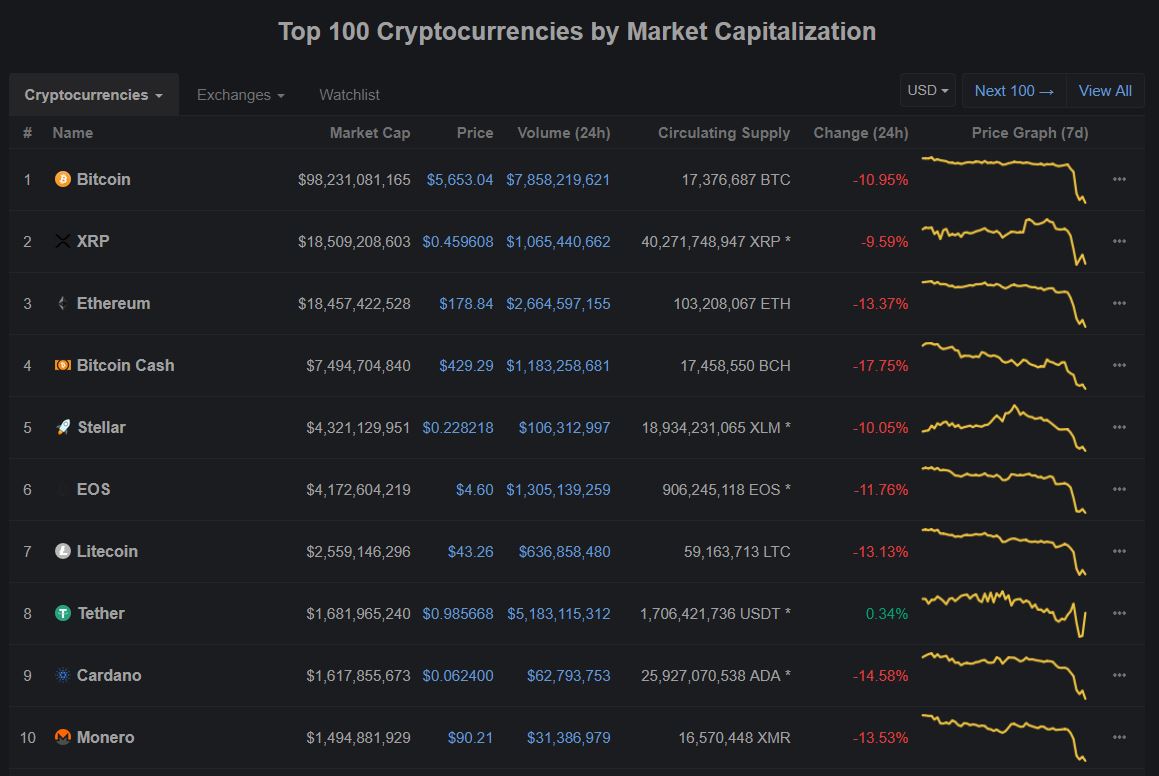
2019-3-1 20:00 |
Saifedean Ammous, economics professor and author of The Bitcoin Standard, spoke with Bitcoinist in an exclusive interview. He explains why he is encouraging people to ‘pirate’ his book and why he believes central banks want nothing to do with a hard money like bitcoin.
Saifedean Ammous: I Neither Care or Know About This ‘Crypto’ ThingBitcoinist: You book The Bitcoin Standard was released last spring. How was it received compared to your expectations?
Saifedean Ammous: The reception has exceeded my expectations. I expected my book to only be read by a few bitcoiners and hoped that if Bitcoin continues to grow, the book would attract more attention over time. But far more people have read the book than I expected, particularly as it came out months into a bear market.
But the best part for me is the large number of people who became interested in Austrian economics after reading my book.
A friend told me I had used Bitcoin as a trojan horse with which to spread my ideas on Austrian economics, and I found it hard to argue with him! So it makes me very happy to see people appreciate the economics in the book.
Can you share some positive reactions to your book? Has it been effective in educating and changing people’s views on economics?
The reactions that meant the most to me came from old-school Austrian economists who were impressed with the economics in the book. That Mises Institute President Jeff Deist loved my book meant a lot to me, and when an older reader emailed me to tell me that my explanation of the history of money was the best he’d read in decades of reading Austrian economics, I was floored speechless, which doesn’t happen often!
Several people have told me the book opened their mind to a new way of thinking about economics. A lot of people have told me they first learned about time preference from my book and it really changed how they take decisions in life. I have gotten positive feedback from people all over the world, particularly now as my book is being translated to 13 languages.
Only yesterday I heard from a reader at Stanford University that he shared my book with his professor in a class on cryptocurrency law, and the professor liked it so much he made it the textbook for the class. It is all pretty surreal for me, to be honest, but I am absolutely delighted by it. Many people think I’m crazy and my ideas insane, and they may well be right, but at least now I know I’m not the only one!
Did you receive any, in your opinion, valid criticism?
My book has several key concepts:
1- The stock-to-flow ratio, the hardness of money, and why the hardest money wins.
2- The relationship between hard money and time preference.
3- The relationship between hard money and capital allocation.
4- Relationship between hard money and the size and extent of government, and individual freedom.
5- How difficulty adjustment makes bitcoin the hardest money ever invented, and how that helps us understand its fast rise.
6- How Bitcoin’s scaling is likely to develop with second layer solutions allowing many more transactions than on-chain transactions, analogous to the development of the gold standard.
7- How bitcoin’s decentralized nature makes it far more resistant to confiscation and government control than gold is, raising the intriguing possibility that bitcoin might turn out to be the monetary basis for a free market monetary system.
I have read all the negative reviews of my book and can honestly say none of them engaged with these ideas seriously, let alone tried to refute them beyond the juvenile snarky straw-manning, which most people think is a substitute for wit, intelligence, and coherent thought these days.
The only exception is the review from Reason magazine, which briefly discussed some of these concepts, before criticizing the book for not dedicating longer sections trying to argue with the reviewer’s favorite economist’s objections to bitcoin, much as they are tangential to the book, and in spite of them not even being explicated anywhere clearly.
Beyond that, we had a few professional bitter nocoiners write hilariously bad hatchet-jobs, which used their inability to understand complex economic concepts as a counter-argument to these concepts, misrepresented my points to make them sound ridiculous, and nit-picked over irrelevancies. Such rubbish is beneath dignifying with a response, as I would have nothing to respond with but to try to dumb down the book to be understood by people cognitively-damaged from decades of statist indoctrination masquerading as Economics. I have no interest in dumbing down my work, nor in engaging with endless bitter debates with people who have never read any economics textbook that is not government-approved.
I would still love to read a serious review that engages systematically, rigorously, and critically with any or all of the above key points. To any potential aspiring reviewers, if you’d like your review to be taken seriously, here’s how you do it: first demonstrate your familiarity with the main theses of the book, and then coherently explain why they are wrong. More importantly, explain why it matters that these theses are wrong, and how they come to bear on the conclusions of the book, and on the real-world phenomena the book discusses. Should you find major flaws in the book, it would be trivial to find flawed real-world implications of the analysis. The more time you spend nitpicking the more you confirm you cannot find fault with the main arguments.
Unlike most authors, you’ve been openly encouraging people to download your book for free. Why?
Ideas are non-rival goods, meaning one person’s exposure to an idea does not limit another’s ability to understand it. This makes me believe that ideas cannot be property, and any attempt to enforce that is unlikely to succeed. Sharing a book online is no different in essence than lending a book to a friend, or a public library allowing people to borrow books for free; it is just more efficient.
If you don’t want your book pirated, you should consider also banning libraries from stocking it, and preventing people from sharing it, or even discussing it with others!
I would highly recommend reading Stephan Kinsella’s Against Intellectual Property for a comprehensive discussion of this point. More specifically, the point behind writing a book is to spread ideas, and so anything that helps spread my book helps me in my mission and is welcome. Publishing was supposed to be the industry that does its best to distribute the work of an author. After the development of many online tools for cheaper and faster distribution, publishers have tried to protect their business by limiting the channels of distribution open to the author, in order to try to keep all demand coming to their distribution channels.
But I believe this has been bad for readers and writers, and arguably for publishers. Promoting the free distribution of books online has been shown quite beneficial for sales in several cases, as free availability allows many people to look into a book they wouldn’t buy otherwise. Many will then choose to buy the physical book, many will buy it as a gift, and many will discuss it with their friends, driving them to want to buy it, too. I do not want people to think I am being a martyr by accepting the piracy of my book; I believe it is better for me, for my readers, and for my publisher, because this is what is supposed to happen with knowledge.
Does Bitcoin reflect the principles of the Austrian school of economics even more-so than gold?
I don’t think gold or bitcoin reflect the principles of the Austrian school, which is in its principles agnostic about what should constitute money. The Austrian understanding of sound money is that it is the money that is chosen on the free market, and whose value is determined through peaceful interaction between traders, not imposed through coercion.
In my book, I discuss why I believe the difficulty of increasing their supply makes both gold and bitcoin likely to win in a free market competition for monetary status, but it is, in my mind, understandable for Austrian economists to remain skeptical of bitcoin.
It takes an enormous amount of time and effort to get an understanding of how bitcoin works, and most people don’t have the time to do it.
Why do you think that most ‘gold-bugs’ and proponents of Austrian economics today still largely shun Bitcoin?
Austrian economists are likely to be particularly skeptical as they have a good understanding of monetary history and have read of many centuries of people coming up with monetary solutions that are ‘better than gold’, from Roman coin clippers to John Law’s land-backed assignats, to modern paper money and Keynesian and Marxist cranks’ ridiculous notion that debt is money. Thousands of such cranks have come and gone, and their hare-brained concoctions have all failed and disappeared without a trace, while gold continues to be humanity’s prime money, still stocked by central banks worldwide, who continue to increase their gold stockpiles every year over the last decade.
It is entirely understandable that anyone with a familiarity with monetary history would be skeptical of any claims of a new or better gold, and that was true for me for a long time, too.
I first heard of Bitcoin quite early, likely in 2010, and while as an Austrian economist I liked the idea, I was extremely skeptical that it could work, and it took me many years of learning about the technology behind bitcoin to begin to appreciate that this might be more than an online toy, and that it has a good chance of surviving government attacks.
I can understand that other Austrian economists, particularly the older generation, will remain skeptical for a longer time than I, and find their skepticism to be the most useful for understanding bitcoin and any potential limitations or failure scenarios.
There have been rumors that countries may be considering buying bitcoin as a way to bypass international sanctions and diversify their strategic assets. Do you expect this to happen any time soon?
I don’t. In my subscription research bulletin service I wrote at length on why I find the notion of central banks adopting BTC to be far-fetched. Primarily, it is because the kind of mental frameworks necessary for getting a job at a central bank completely precludes someone from understanding the possibility that bitcoin could seriously work or succeed.
Central bankers believe in the ridiculous idea that government needs to manage the money supply, otherwise, they’d be in a different line of business.
They cannot conceive the idea that money can emerge on the market without governments, and will thus continue to dismiss bitcoin for a very long time. Central banks are also enamored with inflationist monetary policy, completely oblivious to the possibility, thoroughly explicated in reams of Austrian scholarship, that it is precisely their manipulation of capital markets that is at the root of financial crises.
The idea that a modern central bank will seek to tie its own hands by adopting a hard money is rather fanciful.
Governments facing sanctions may hate the US Government and its dollar, but they don’t hate them as much as they love having their own easy money,which allows them to pilfer and control their own populations.
As the subtitle of my book says, if Bitcoin continues to succeed and grow, I would expect it to succeed as a ‘Decentralized Alternative to Central Banking’, the only technology for sending money around the world without government supervision, and the only politically neutral independent monetary policy.
What are your thoughts on the growth of the second-layer Lightning Network that we’ve seen in the past year?
I am astonished at the fast growth of this network, and very impressed with the people working on it, particularly Pierre Rochard who’s made it very easy for people to start experimenting with lightning nodes, and is getting dozens of new people to try it out every day.
I really look forward to seeing what happens with these channels if (or, more likely, when) we get large demand for transaction and higher fees. It will likely be the spur that moves lightning from being a hobby now to a serious and important payment layer on top of bitcoin.
What do you attribute the bitcoin price drop over the past 14 months to?
I don’t do price analysis and have no special magic ball to predict what the price will be. I remain under-invested in bitcoin because of this volatility and so don’t need to worry too much about it, and my response to anyone worried about the price is that they should reduce their position until they stop worrying about it! I would expect we will still have plenty of volatility moving forward, so you better be prepared!
We’ve seen many doom-n-gloom headlines about Bitcoin’s energy consumption, which you recently talked about at the Unconfiscatable conference. Can you share some of your latest research on this topic?
Many bitcoin defenders make the mistake of attempting to compare the amount of energy consumption taking place in the banking system to bitcoin’s energy consumption, in an attempt to argue bitcoin consumes less energy. I do not find this comparison accurate, because as discussed in my book, I do not think bitcoin replaces banking, or the functions of banking.
It rather replaces central banking, being a primitive and barbarian edifice, consume nowhere near as much energy as bitcoin in the same way outhouse cleaners consume less energy than a sewage system, or horses consume less energy than cars.
That did not stop cars from displacing horses, and our quality of life has not suffered from all the extra energy we have “wasted” on cars instead of riding horses.
The benefits incurred from this move are incalculable for us, primarily by not having to deal with horse manure as a permanent fixture of life. In a very similar way, the benefits of bitcoin lie in the horrors it would allow us to avoid by taking money production out of the hands of the state’s violent Keynesian barbarians.
What is your opinion on the ‘crypto needs rules‘ narrative and that regulations are needed for the mass adoption of bitcoin to happen?
I neither care or know about this “crypto” thing people keep talking about. I only care about bitcoin. Bitcoin, of course, does need rules, and they are laid out in the consensus parameters and code that your node runs.
I presume people who publicly talk about Bitcoin needing rules surely understand that the only rules they can enforce on bitcoin are the ones they enforce on their own node, and that any new rules they would like to introduce to other nodes need to be presented as a Bitcoin Improvement Protocol for other network members to consider and adopt willingly. Because if they are talking about any other kind of rules… they’re going to have a bad time!
What can we look forward to this year from Saifedean Ammous?
As part of The Bitcoin Standard Research Bulletin I am writing a monthly report on an economic question related to Bitcoin available to subscribers who would like to see me write more and in more depth on critical bitcoin economic questions.
The first bulletin discussed the possibility of the emergence of fractional reserve banking in bitcoin, the second one discussed the likely scenarios for bitcoin’s continued monetization, and why I think hyperinflationary collapse of fiat currency is unlikely.
The third bulletin discussed the economics of bitcoin’s energy consumption and the likely impact bitcoin will have on global energy markets. The fourth bulletin had focused on the relationship between government easy money and nutritional and soil degeneration in the twentieth century.
The fifth bulletin, just released, discusses the most likely scenarios for bitcoin failure I can imagine, namely: a government gold standard, and failure in a free market competition against gold.
I plan on turning these chapters into another book around the end of the year, and so if you would like to read them but don’t want to subscribe, please keep your time preference low and wait a bit, and I hope you appreciate that the early-access subscription model allows me to dedicate more time to writing these reports, and to be more liberal with the distribution of the book. You can subscribe or buy previous reports in bitcoin, or subscribe on patreon.com/saifedean. See my blog for more details.
Due to the increasing interest among my readership in Austrian economics, I also plan on offering online lectures and seminars on various topics in Austrian economics. Students would get video lectures, syllabi, and class notes and learn at their own pace. For those interested in a more structured and interactive approach, I will be giving weekly 1-hour online seminars limited to 10 students each, where we have thorough discussions of the reading material.
The idea is to recreate the student-teacher relationship on which a university should be based, but which has been almost entirely disfigured today. Universities continue to charge ever-increasing prices while students continue to get less time with qualified faculty.
Where is all that money going, you ask? The administrators and the non-teaching staff at universities whose numbers have mushroomed as much as their pay in recent decades, with dubious benefits to students looking to go to university for old-fashioned education rather than a consumer experience and political brainwashing.
Like anything run on easy government-credit, as discussed in The Bitcoin Standard, education has turned into a bureaucratic game where success is determined by who manages to play their bureaucratic games better, and not who provides value to students.
Instead of writing and complaining about it, I am taking matters into my own hands and eliminating all the middle-men from the student-teacher relationship, hoping to offer students quality courses and a lot of time for discussion at a tenth of what they would pay at a university. Stay tuned for more details!
What do you think of Saifedean Ammous’ responses? Share your thoughts below!
Images courtesy of Shutterstock, Bitcoinist archives
The post Idea of Central Banks Buying Bitcoin is ‘Far-Fetched’ – Saifedean Ammous (Interview) appeared first on Bitcoinist.com.
origin »Bitcoin price in Telegram @btc_price_every_hour
Bitcoin (BTC) íà Currencies.ru
|
|








